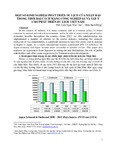Please use this identifier to cite or link to this item:
https://thuvienso.bvu.edu.vn/handle/TVDHBRVT/19053Full metadata record
| DC Field | Value | Language |
|---|---|---|
| dc.contributor.author | Lâm, Ngọc Như Trúc | - |
| dc.contributor.author | Biện, Bạch Đằng | - |
| dc.date.accessioned | 2018-07-13T07:50:35Z | - |
| dc.date.available | 2018-07-13T07:50:35Z | - |
| dc.date.issued | 2018 | - |
| dc.identifier.issn | 978-604-73-5980-6 | - |
| dc.identifier.uri | http://thuvienso.bvu.edu.vn/handle/TVDHBRVT/19053 | - |
| dc.description.abstract | In the context of Industry 4.0, many countries aim at a tourism policy to better conserve its natural and cultural environment, and to be able to more evenly spread socioeconomic benefits throughout the country. From 2012, the Abe administration has implemented a number of reforms in the tourist industry, including the strategic relaxation of visa requirements, a significant increase in duty-free stores, and in increase in flights to Japan. As a result, international tourists contributed JPY 3.5 trillion to the Japan economy and Japan become more accessible to outside visitors. This paper also explores the experiences from Japanese in setting the unit destinations, the role of public stakeholders and offers some suggestions for Vietnam tourism development | vi |
| dc.language.iso | vi | vi |
| dc.publisher | ĐH Quốc gia Tp Hồ Chí Minh. | vi |
| dc.relation.ispartofseries | Kỷ yếu hội thảo khoa học; | - |
| dc.subject | Du lịch -- Việt Nam | vi |
| dc.title | Một số kinh nghiệm phát triển du lịch của Nhật Bản trong thời đại cách mạng công nghiệp 4.0 và gợi ý cho phát triển du lịch Việt Nam. | vi |
| dc.type | Article | vi |
| Appears in Collections: | Kỷ yếu - Hội thảo | |
Files in This Item:
| File | Description | Size | Format | |
|---|---|---|---|---|
| LNNTruc-BBDang.pdf | 533,09 kB | Adobe PDF |  Sign in to read |
Items in DSpace are protected by copyright, with all rights reserved, unless otherwise indicated.